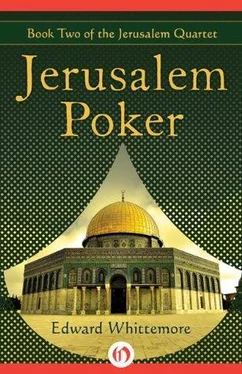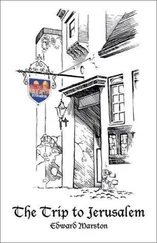By the end of the afternoon the judge was convinced the extenuating circumstances in the case were many. The filthy foreigner's rank perversity had been more than made evident, as had the extreme provocation to violence that he had provided at the time of the crime by his ugly costume and uglier weapons, and especially by his abominable death's-head mask. The peasant boy was therefore sentenced to only twenty years in an agricultural prison where tomatoes were grown, each day of labor to serve as two days off his sentence, so that with good behavior he could be out in only six years.
But meanwhile, and more important for the nation, the entire contents of Mahmud's villa were to be sent under guard to Tiranë for inspection by higher authorities, possibly to include King Zog himself, to see whether the AA might indeed have been a cunningly disguised Bolshevik plot to invade the country and assassinate the king, after entry had been achieved by corrupting youths at a key point on the vulnerable Albanian coastline.
As soon as the trial was over Nubar received detailed reports in Venice on the proceedings. Sophia returned from Istanbul and wrote to him in amazement asking what he was suddenly doing in Italy. Nubar replied vaguely that he had felt the need for a vacation. Lately he had been working too hard on his mercury experiments, he said, and had decided to come to Venice for a rest, following Sophia's long-standing advice. The city enchanted him so much, he added, that he had bought a palazzo on the Grand Canal for other vacations in the future. Sophia, delighted that he was at last getting out of his tower room and into the world, immediately sent him a cable. Over the next few days there was a brief exchange.
WONDERFUL NEWS, NUBAR, I'M SO HAPPY FOR YOU. NOW TRY TO GET OUT AND
ENJOY THE SIGHTS. DON'T SIT INSIDE YOUR PALAZZO ALL DAY BROODING, AND
STAY AWAY FROM MERCURY FOR A WHILE. READ POETRY. IT WILL CLEAR YOUR
MIND.
* * *
MY MIND AND CONSCIENCE ARE PERFECTLY CLEAR, BUBBA. FURTHERMORE, I'M
OUTSIDE A GREAT DEAL. I SPEND MANY HOURS IN THE PIAZZA IN FRONT OF SAN
MARCO'S.
* * *
LOVELY. NOTHING COULD BE BETTER FOR YOU. IT'S SO BEAUTIFUL THERE. DRINK
PLENTY OF MINERAL WATER FOR YOUR GAS, GET A LOT OF SLEEP AND HAVE A GOOD TIME.
* * *
THANKS. GAS UNDER CONTROL. HAVING WONDERFUL TIME IN THE MYSTERIOUS
WINTER MISTS THAT CLOAK THE CITY. PERFECTLY ENCHANTING.
If only she knew, thought Nubar, setting out again in the cold fog at sundown, heading for San Marco's with his stack of thick journals, the rambling testimonials to himself that he spent all day, every day, writing.
The journals contained passages describing his sadness for the fate of the peasant boy convicted of murder in Gronk, who had originally been his lover, not Mahmud's, although no mention was made of that. But most of the pages were devoted to long incoherent attacks on every conceivable aspect of Mahmud's character and behavior.
In addition the journals contained lengthy spurious histories of the AA, which proved beyond any reasonable doubt that the organization had been founded and run solely by Mahmud, while he, Nubar, hadn't really known of its existence. In fact, he had never even suspected that it existed. He simply had no idea there could ever have been such a monstrous group as the AA operating secretly in sleepy little Gronk.
Furthermore, the correct name of that foul organization, spelled out in large letters at the top of every page in the journals so no one could mistake it, was the All-Afghanistan Sacred Band, proof of the utterly foreign nature of the conspiracy which had always been completely alien to the Albanian way of life and the Albanian national character, not to mention Albanian ideals and the Albanian work ethic, and in its lazy decadence, even contrary to Albanian efficiency. As Nubar made perfectly clear in the journals, the AA could only have been the product of a filthy foreigner's diseased and totally aberrant mind.
The entire affair, in short, was a frightening case of Afghan mountain madness let loose in a small, quiet, civilized, respectable, law-abiding Albanian fishing community.
And lastly, there were numerous eulogies to the Albanian prison system in the journals, particularly to its agricultural prisons, along with arguments that showed a few years in one of them, growing tomatoes, couldn't help but be a healthy experience for a peasant boy who had previously known only the confines of a small seaside village.
The Boy.
The letters appeared on the covers of each of Nubar's journals. All day long he scribbled illegibly in his journals, sipping mulberry raki to steady his nerves, then gathered up the journals at twilight and went off to San Marco's where he moved from café to café, accosting strangers to read them passages aloud from the journals, or thrusting the journals into the hands of astonished tourists and trying to run away, so they would be trapped with them and perhaps read a page or two.
Spring passed into summer and summer into autumn. Sometime before the whiter fogs descended once more, the Melchitarists informed him that his wife, who had deserted him on their wedding night upon seeing what kind of person he was, had given birth to a son in the Armenian community in Venice where she had returned to live. Nubar told them the boy was to be named Mecklenburg Wallenstein, an effort by Nubar to retain a small measure of self-respect by recalling past family glory, the uncle of the first Albanian Wallenstein having once been created the Duke of Mecklenburg by the Holy Roman Emperor for his extraordinary military services during the Thirty Years War.
But past glories couldn't relieve the restless despair Nubar now felt as he made his nightly rounds of the cafés in the piazza in front of San Marco's, hiding in archways until the waiters were looking the other way and then darting between the crowded tables, quickly squeezing along trying to distribute his journals, trying to make people see the truth, trying to get someone, anyone, to listen to his absolutely accurate account of past events in Gronk.
In what? asked a startled tourist.
Nubar thrust his journals forward.
Gronk, he raved. Are you mad? Are you deaf? Gronk, I said. Gronk.
By now even the most worldly tourists were thoroughly alarmed. Sticky pastries and cups of black coffee came flying, the weapons at hand used by waiters and café patrons who were outraged by his skulking behavior around their tables, his furtive whispers as he sneaked up behind them and tried to drop one of his journals into their laps before they knew what was happening.
So the sticky pastries rained down on him, the cups of thick scalding coffee shot by his head and Nubar had to turn and run, crashing into walls in the darkness, in the eerie fog-bound emptiness of the huge deserted piazza where a distant footfall sounded as if it were right beside him, fleeing around and around through the night on the slippery cobblestones, lost in the mists and the drizzle of a Venetian winter, stumbling and falling and clutching to his chest the precious journals that were capable of explaining Gronk in its entirety, if only someone would read them, which no one ever would.
Just before dawn he collapsed in a gondola and ordered his gondolier to hurry down the Grand Canal so he could reach his palazzo before daylight came. Gliding over the water then with bits of stale pastry clinging to his face, his evening clothes muddied and his opera cloak ripped and his top hat newly dented, he lay in the bottom of the boat haggard and trembling and dizzy, sinking deeper into a stupor, dangerously weak because he now ate only a single baked chicken wing twice a day, a morbid compulsion toward self-starvation that had come to overwhelm him in the last year. And deliriously drunk as well from the mulberry raki he always carried to the piazza at nights in a wooden canteen slung over his shoulder, another compulsion toward self-destruction that had come to overwhelm him in the last year.
Читать дальше












